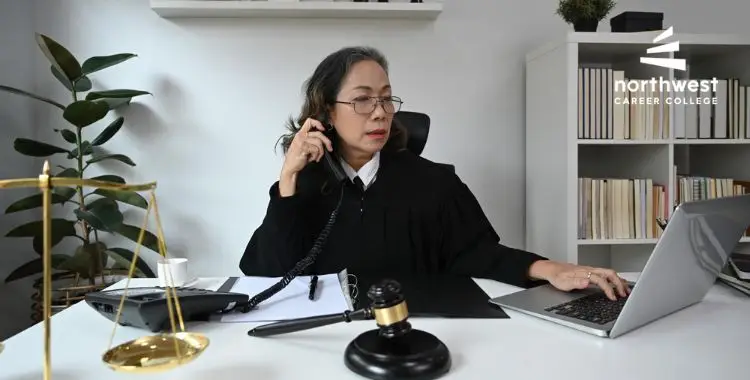Top 5 Important Legal Terms All Legal Assistants Should Know
- March 12, 2024
- 4.2k views
- 4 min read

Modern legal assistants are required to have a working knowledge of many different types of law and the terminology associate with them. However, some legal terms are used more commonly, and are therefore more important to know, than others.
In this article, we’ll be looking at five of those terms and explaining exactly what they mean.
Know More: How to Become a Legal Assistant?
Important Legal Terms All Legal Assistants Should Know
An Affidavit
An affidavit is a document is a written statement from an individual that they swear to contain true facts. In order for a person to complete an affidavit, they have to have the mental capacity to understand the seriousness of the oath.
This document gets its name from the fact that the person writing the affidavit is called the affiant, from medieval Latin affidare ‘declare on oath’, although they can also be referred to as a deponent.
Generally, these documents are witnessed by an assigned taker of oaths, such as a notary public or commissioner of oaths, to ensure the authenticity of the affiant’s signature.
Arraignment
Arraignment is the process by which those persons arrested and charged with crimes are brought to a court of law, informed of the charges laid against them, and are then asked to plead guilty or not guilty to those charges.
Binding Precedent
A binding precedent is the result of a previous decision by another court, the results of which then informs the decisions of other courts. Generally, a binding precedent is set by the U.S Supreme Court as the highest possible court in the land.
Commonly cited binding precedents include Roe v. Wade on abortion rights, Miranda v. Arizona for arrest rights, and Lawrence v. Texas when it comes to LGBT rights.
Habeas Corpus
Another term from medieval Latin, Habeas Corpus translates roughly to “we, a court, command that you have the body of the detainee brought before us”. Habeas Corpus is used as a specific against illegal imprisonment.
A writ of habeas corpus is used to bring a prisoner or other detainee, such as an institutionalized mental patient, before a court to determine if the person’s imprisonment or detention is lawful.
Nolo Contendere
A rather confusing legal plea in which the defendant accepts punishment while, at the same time, not admitting to being guilty of the charges brought against them.
Nolo contendere, which translates from Latin as “I do not wish to contend” is often used to shield the defendant from having a guilt plea used against them in later civil or criminal proceedings.
Choosing Your New Career Path
Gaining a qualification from our Criminal Justice School puts you in an excellent position to access a variety of employment opportunities as you look for one that suits your skills and interests.
At Northwest Career College, our Criminal Justice instructors include licensed, practicing attorneys and degree instructors able to teach, not only the law but also to guide our students in the many ways a criminal justice graduate integrates into a Las Vegas legal profession.
As part of our Criminal Justice Program, you’ll visit courts, jails, meditation centers, and more to experience first-hand the law in action, which will make your criminal justice training applicable to the Las Vegas legal system.
Northwest offers a flexible blended program with all criminal justice classes Las Vegas law classes taught on campus by an attorney and general education courses offered online. Our experienced instructors are on-campus to review and support your learning experience at all times.
Call us at (702) 403-1592 to speak to one of our enrollment team about joining our Criminal Justice Program today!



